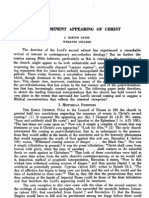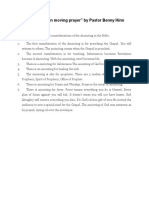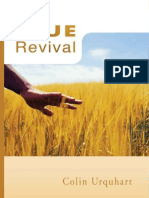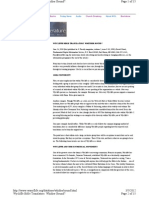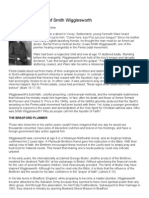HI260 Course Outline
HI260 Course Outline
Uploaded by
Rashidi MaokolaCopyright:
Available Formats
HI260 Course Outline
HI260 Course Outline
Uploaded by
Rashidi MaokolaCopyright
Available Formats
Share this document
Did you find this document useful?
Is this content inappropriate?
Copyright:
Available Formats
HI260 Course Outline
HI260 Course Outline
Uploaded by
Rashidi MaokolaCopyright:
Available Formats
UNIVERSITY OF DAR ES SALAAM
DEPARTMENT OF HISTORY
HI 260: Philosophies and Methodologies of History
First Semester, 2022/2023 Academic Year
Instructors
i. F. Edward (PhD), (coordinator) – Office No. 157
ii. G. Ambindwile (PhD), Office No. 151
iii. M. Wington (MA), Office No. 147
Consultation Hours: Mondays 16-17 hrs; Thursday 17-18 hrs
Lectures: Monday 15-16 hrs, Nkrumah Hall; Thursday 13-14 Hrs, Nkrumah Hall
Seminar Hours: Tuesday 13-14 COAF LR5, 16-17ALRB, 17-18ALRD; Wednesday 13-
14ALRB, 15-16MB; Friday 13-14ALRD, 14-15 Cass C.
Course Objectives
The course is designed to develop adequate awareness to students seeking to become professional
skilful historians about the philosophies and methodologies that overtime shaped the study of
history. The underlying assumption is that historians construct and reconstruct histories influenced
by the socio-political and economic environments that surround their production and
reproduction conditions. It is anticipated that upon completion of the course, students will be able
to develop a more critical attitude towards the various history courses they come across and the
source materials used to (re)construct them.
Course Description
This is a theoretical and practical course that introduces students of history to the changing
philosophical and methodological foundations of historical scholarship over the entire period of
the existence of this discipline. It is thus a basic course for history professionals as it exposes them
to the art and skills of the study of history by making an exposition of the philosophies and
methods explored by the fathers and founders of the study of history. The course is therefore
divided into four main parts and starts by an overview on philosophy of history. The course then
embarks on examination of pre-capitalist philosophies and methodologies, and then proceeds into
the capitalist phase philosophies and methodologies and finally rounds up by an investigation on
contemporary philosophies and methodologies.
Course Delivery
The course will be covered in 45 hours and will be conducted through lectures, seminar
discussions assignments and tests. 28 hours will be used for class lectures 10 hours for seminars
and 7 hours for tests and assignments.
Course Assessment
The course will be evaluated through continuous assessment (CA) and a final written
examination (UE). The CA component consists of the following segments: 1. Seminar
presentation 10%; 2. Tests, quiz and/or individual assignments 30%. The remaining 60% has
been allocated to UE component.
NB: Make sure you prepare your assignments well in advance to avoid unfounded excuses. Final
seminar papers must be submitted on the day of presentation both in hard copies.
Attendance to all lectures and seminars is mandatory unless stated otherwise.
1|Pag e ©History-UDSM 2022/23
Important dates: First lecture – Monday 7th November 2022, First Seminar – 2nd week of the
semester, First Test – 5th week, Second Test/Assignment – 10th week.
COURSE OUTLINE
Module 1: The Subject Matter of Philosophy of History
1.1. Concepts: History, Philosophy, Philosophy of History, History of Philosophy,
Historiography
1.2. Subject Matter of Philosophy
1.3. Methodologies of History
Module 2: Pre-Capitalist Philosophies and Methodologies
2.1. Ancient Chinese philosophy and historiography
2.2. Greco-Roman and Christian Philosophy and methodology of history
2.3. Islam and Arab philosophies and methodologies
2.4. Philosophy of history in other parts of the world
Module 3: Philosophies and Methodologies during Mercantilism and Competitive Capitalism
3.1. Historiography during the emergence of capitalism
3.2. The rise of scientific practice
3.3. Historiography during consolidation of capitalism
3.4. Rise of positivism and speculative materialism
Module 4: Historiography during the Crisis of Capitalism
4.1. Consolidation of the Bourgeoisie and Bourgeois historiography
4.2. Proletariats and the proletarian historiography
4.3. Anthropology and evolution
Module 5: Early to modern European Philosophies of history
5.1. Theories of society and history under capitalism
5.2. Annals School of historiography
5.3. Anthropology and structural functionalist history
5.4. Modernization and Post-modernism
Module 6: Developments in African Historiography
6.1. Development of African historiography up to WWII
6.2. Colonialism, colonial historiography
6.3. Critique of colonial historiography-liberals, nationalists, underdevelopment and
Marxists
6.4. Africanists and the African history
6.5. Post-modernist tradition and the future of African history
2|P ag e ©History-UDSM 2022/23
Key References
Ankersmit, F.R. “Historiography and Postmodernism”. History and Theory 28 no. 2 (1989): 137-
153.
Atkinson, R.F. Knowledge and Explanation in History: An Introduction to the Philosophy of History.
London: Macmillan, 1989.
Bernal, M. Black Athena. London: Vantage, 1987.
Bernstein, Henry and Jacques Depelchin. “The Object of African History: A Materialist
Perspective.” History in Africa 5 (1978): 1-19.
_____ . “The Object of African History: A Materialist Perspective - II.” History in Africa 6 (1978):
17-43.
Breisach, Ernest. Historiography: Ancient, Medieval and Modern. London & Chicago: The Chicago
University Press, 1994.
Carr, Edward H. What is History? London, 1961.
Collingwood, R.G. The Idea of History. Oxford, 1946
Cooper, Frederick. Africa in the World: Capitalism, Empire, Nation-State. Harvard University Press,
2014.
Cooper, Frederick. Colonialism in question: Theory, knowledge, history. Berkeley: University of
California Press, 2005.
Davidson, Basil. The Black Man’s Burden. New York, 1992.
Diop, Sheikh Anta. The Cultural Unity of Negro Africa. Paris: Presence Africaine, 1962.
Francis Fukuyama, “The End of History,” mimeo (1991)
Hegel, G.W.F. Philosophy of History. Indianapolis, 1953.
Hughes-Warrington, Marnie. Fifty Key Thinkers in History. London & New York: Routledge, 2008.
Khaldun, Ibn. The Muqqadimah. Princeton: Princeton University Press, 1989.
Ki-Zerbo, J. (ed). UNESCO General History of Africa, Vol. I: Methodology and African Pre-History
California: Heinemann, 1990.
Lawi, Y.Q., “Pros and Cons of Patriotism in the Teaching of MajiMaji”. Tanzania Zamani 9 no. 1
(2009).
Mbembe, A., and Steven Rendall. "African modes of self-writing." Public Culture 14 no.1 (2002):
239-273.
Mudimbe, V.Y. The Idea of Africa. Bloomington and Indianapolis: Indiana University Press, and
London: James Currey, 1994.
Mudimbe, V.Y. The invention of Africa. Bloomington: Indiana University Press, 1988.
Ranger, Terrence. ‘The New Historiography in Dar es salaam: An Answer.’ African Affairs 70,
No. 278, (1971), 50-61.
St. Augustine. The City of God. New York: Catholic University of America Press, 1958.
Tosh, John. The Pursuit of History. New York, 1998.
Tucker, Aviezer (ed.) Companion to Philosophy of History and Historiography. London, 2009.
Vansina, J. Oral Traditions as History. Oxford: James Currey, 1997.
Wamba-dia-Wamba, Ernest. “How is Historical Knowledge Recognized?”
Wiener, Philip P. "On methodology in the philosophy of history." The Journal of Philosophy 38
no.12 (1941): 309-324.
3|P ag e ©History-UDSM 2022/23
SEMINAR TOPICS
1) What do you understand by the concept ‘history’? Illustrate your discussion based on
Edward H. Carr’s What is History?
2) Discuss the main similarities and differences between Philosophy and Philosophy of history.
(Use John Zammito’s “Discipline, Philosophy, and History” and additional sources of your
choice)
3) Explain the main characteristics of Ancient Chinese Philosophy of history and
historiography.
4) Account for the main tendencies of the Greco-Roman historiography.
5) Examine the basic features and impact of the enlightenment movement in European
history.
6) Analyse the main philosophical and methodological tendencies of the proletarian
historiography in Europe between the 19th and 20th centuries.
7) With reference from Terence Ranger, ‘The New Historiography in Dar es Salaam’, assess
the main strengths and weaknesses of the Dar school of historiography in reconstructing
African history.
8) Using Henry Bernstein and Jacques Depelchin’s “The Object of African History: A
Materialist Perspective”, identify and discuss the main controversial issues between
bourgeois and Marxist perspectives on African history.
9) Briefly, state what is postmodernist historiography, and assess it influence on African
historical research and writing.
10) Examine different meanings of decolonisation as used in modern African history.
4|P ag e ©History-UDSM 2022/23
You might also like
- John Paul Jackson PDF FreeDocument5 pagesJohn Paul Jackson PDF FreeBenit Mvuezolo100% (1)
- Elena Armas - The Spanish Love Deception (Aaron's POV)Document13 pagesElena Armas - The Spanish Love Deception (Aaron's POV)dbbahahabNo ratings yet
- Law ProjectDocument28 pagesLaw ProjectKahif raza100% (1)
- What Are Qualities of A True Prophet of God?Document126 pagesWhat Are Qualities of A True Prophet of God?Moiz Uddin QidwaiNo ratings yet
- Nigeria Charismatic Pentecostal HistoryDocument22 pagesNigeria Charismatic Pentecostal HistoryRichard Oluseyi Asaolu100% (1)
- The First Gospel of The Infancy of Jesus ChristDocument25 pagesThe First Gospel of The Infancy of Jesus ChristMichael MengeNo ratings yet
- Elijah Is Coming - Sadhu Sundar SelvarajDocument417 pagesElijah Is Coming - Sadhu Sundar SelvarajvishalNo ratings yet
- Discipling The NationsDocument60 pagesDiscipling The NationsAll JKLNo ratings yet
- The Grace of GodDocument4 pagesThe Grace of Gododunayoesther100% (2)
- Revival FiresDocument229 pagesRevival FiresJohann Maks100% (1)
- Journal of African Christian BiographyDocument18 pagesJournal of African Christian BiographyJOHNNo ratings yet
- The Holy Spirit1Document10 pagesThe Holy Spirit1Daniel EtseyNo ratings yet
- Payne - The Imminent Appearing of Christ (BETS 2-3 8-13)Document6 pagesPayne - The Imminent Appearing of Christ (BETS 2-3 8-13)Mick Rynning0% (1)
- 7 Keys To Mountain Moving Prayer" by Pastor Benny HinnDocument3 pages7 Keys To Mountain Moving Prayer" by Pastor Benny HinnPRASAD100% (2)
- Paul's System of Truth - Mark HankinsDocument303 pagesPaul's System of Truth - Mark HankinsREBOCONo ratings yet
- True RevivalDocument53 pagesTrue Revivalmoses0% (1)
- Doctrine of Holy Spirt Indwelling in The OT SaintsDocument27 pagesDoctrine of Holy Spirt Indwelling in The OT Saintsthelightheartedcalvinist6903No ratings yet
- Winds of GodDocument213 pagesWinds of Godnani100% (1)
- Booth - in Darkest England - 1890Document323 pagesBooth - in Darkest England - 1890mc.fNo ratings yet
- Pharis Ectomy e PDFDocument175 pagesPharis Ectomy e PDFThasanga ThlauhthangNo ratings yet
- Various Ministries of The Holy Spirit PART 1Document73 pagesVarious Ministries of The Holy Spirit PART 1Jeremiah DimaanoNo ratings yet
- CTTNBC - 004 - Course Outline - The Spirit of EvangelismDocument59 pagesCTTNBC - 004 - Course Outline - The Spirit of EvangelismRev Dr Jeffry Camm JP, MIEPR, MISOPNo ratings yet
- The Sacrifice of Biblical WorshipDocument25 pagesThe Sacrifice of Biblical WorshipJaz SumayoNo ratings yet
- Theories OfatonementDocument17 pagesTheories Ofatonementcollins100% (1)
- Wycliffe Bible Translators, Whither BoundDocument15 pagesWycliffe Bible Translators, Whither BoundJesus LivesNo ratings yet
- The Holy Word For Morning Revival Living and Serving According To Gods Economy Concerning The ChurcDocument347 pagesThe Holy Word For Morning Revival Living and Serving According To Gods Economy Concerning The Churckmnugas04No ratings yet
- East African Revival PDFDocument21 pagesEast African Revival PDFOkwate David EtanuNo ratings yet
- Cell Ministry Strategic Service Outline July 12Document2 pagesCell Ministry Strategic Service Outline July 12Obehi JamesNo ratings yet
- Baptist BeliefsDocument12 pagesBaptist BeliefsRotimi OmogoyeNo ratings yet
- Water BaptismDocument8 pagesWater BaptismDennis MunkhondyaNo ratings yet
- Biblical TheologyDocument4 pagesBiblical TheologyRev'd ThankGod OderotorNo ratings yet
- Apostle (Dowie) ofDivineHealing GordonGardiner PDFDocument22 pagesApostle (Dowie) ofDivineHealing GordonGardiner PDFvic100% (1)
- Book 3 - Cross Cultural Church Planting Series Best Practice ApproachesDocument33 pagesBook 3 - Cross Cultural Church Planting Series Best Practice ApproachesCharis FelixNo ratings yet
- Mensa Otabil: A Pastor's Response During A Challenging TimeDocument2 pagesMensa Otabil: A Pastor's Response During A Challenging TimeMawuena SusuNo ratings yet
- The Gates of Hell Will Not Prevail Against HerDocument438 pagesThe Gates of Hell Will Not Prevail Against HerJoanne NicholsonNo ratings yet
- Isaiah ShembeDocument3 pagesIsaiah ShembeManzini MbongeniNo ratings yet
- Reading Plan: Lord Do It Again!Document52 pagesReading Plan: Lord Do It Again!SpinningScribeNo ratings yet
- WHAT THE POPE IS HIDING - Prophet Uebert Angel - EnglishDocument111 pagesWHAT THE POPE IS HIDING - Prophet Uebert Angel - EnglishArchitecte DelphinNo ratings yet
- The 7 Principles of Effective Evangelism - GLDocument2 pagesThe 7 Principles of Effective Evangelism - GLRodelio C. CatuyNo ratings yet
- 1995 - Daniel Sefa-Dapaah - An Investigation Into The Relationship Between John The Baptist and Jesus of NazarethDocument314 pages1995 - Daniel Sefa-Dapaah - An Investigation Into The Relationship Between John The Baptist and Jesus of Nazarethbuster301168100% (1)
- Life History - William Marrion BranhamDocument29 pagesLife History - William Marrion BranhamJoshlilaNo ratings yet
- Jesus Wisdom and Works of ChristDocument85 pagesJesus Wisdom and Works of Christthelightheartedcalvinist6903No ratings yet
- The Dance of The TrinityDocument2 pagesThe Dance of The TrinityRavikumar DakarapuNo ratings yet
- Revival Legacy of Smith Wiggles WorthDocument5 pagesRevival Legacy of Smith Wiggles WorthDavid BurnetNo ratings yet
- Walk in The Proceeding Word Kobus Van Rensburg Christiandiet - Com .NGDocument11 pagesWalk in The Proceeding Word Kobus Van Rensburg Christiandiet - Com .NGJean Baptiste DimiNo ratings yet
- Homoletics, The Art of PreachingDocument30 pagesHomoletics, The Art of PreachingQuadjo Opoku SarkodieNo ratings yet
- Prayer Revival of 1857-1858Document30 pagesPrayer Revival of 1857-1858J.D. KingNo ratings yet
- Psalms - Executable Outline - Study ResourcesDocument6 pagesPsalms - Executable Outline - Study ResourcesCurrent OrangeNo ratings yet
- Lesson 32-What Is Preaching?Document9 pagesLesson 32-What Is Preaching?henryNo ratings yet
- Foxe Book of MartyrsDocument598 pagesFoxe Book of Martyrsdenmark de veraNo ratings yet
- ST Ephrem On TransfigurationDocument5 pagesST Ephrem On TransfigurationWenxuan YuanNo ratings yet
- Judgment Seat of Christ-7 Types of Eternal RewardsDocument4 pagesJudgment Seat of Christ-7 Types of Eternal RewardsSebastian Palascak100% (3)
- A Divine Revelation of Satan's Deceptions (Mary K. Baxter (Baxter, Mary K.) ) (Z-Library)Document158 pagesA Divine Revelation of Satan's Deceptions (Mary K. Baxter (Baxter, Mary K.) ) (Z-Library)Michou Yao100% (1)
- True Discipleship by William BarclayDocument1 pageTrue Discipleship by William BarclayD.ElderNo ratings yet
- GK 2012 Core CalendarDocument13 pagesGK 2012 Core CalendarDale HudsonNo ratings yet
- Ankur Narula For Android - APK Download: VisitDocument1 pageAnkur Narula For Android - APK Download: VisitGame Tastic ps4No ratings yet
- A Broken Alabaster Jar, A Poured-Out Perfume and An Anointed Testimony: John 12:1-8, Mark 14:1-9Document12 pagesA Broken Alabaster Jar, A Poured-Out Perfume and An Anointed Testimony: John 12:1-8, Mark 14:1-9Sheila SosmenaNo ratings yet
- The Ministry of The ProphetsDocument810 pagesThe Ministry of The ProphetsAnonymous mAoTUdXaNo ratings yet
- Ficha Tecnica Del Cafe para La Exportacion InglesDocument1 pageFicha Tecnica Del Cafe para La Exportacion InglesJose Domingo AriasNo ratings yet
- Genetic Variability Studies For Yield and Yield Components in Kodo Millet (Paspalum Scrobiculatum L.)Document4 pagesGenetic Variability Studies For Yield and Yield Components in Kodo Millet (Paspalum Scrobiculatum L.)Guadalupe Fernando Herrera AcostaNo ratings yet
- 30 TOP SPECIAL PURPOSE DIODES Questions and Answers PDF SPECIAL PURPOSE DIODES Questions and Answers PDFDocument6 pages30 TOP SPECIAL PURPOSE DIODES Questions and Answers PDF SPECIAL PURPOSE DIODES Questions and Answers PDFsanaullahNo ratings yet
- My Last Farewell by Dr. Jose RizalDocument4 pagesMy Last Farewell by Dr. Jose RizalGabriel ManuelNo ratings yet
- F100 EngDocument16 pagesF100 EngpedroaristaNo ratings yet
- 12bDocument67 pages12bDan FarrisNo ratings yet
- Francis Fukuyama: Our Posthuman FutureDocument6 pagesFrancis Fukuyama: Our Posthuman FutureHugo Chesshire100% (1)
- Full Download Banksy Locations and Tours A Collection of Graffiti Locations and Photographs in London England PM Press First Us Edition Martin Bull PDF DOCXDocument81 pagesFull Download Banksy Locations and Tours A Collection of Graffiti Locations and Photographs in London England PM Press First Us Edition Martin Bull PDF DOCXmischomustun100% (2)
- STR KM5000 PDFDocument71 pagesSTR KM5000 PDFNicole WadeNo ratings yet
- PowMr Pow HVM6.2K 48V N User ManualDocument35 pagesPowMr Pow HVM6.2K 48V N User ManualIgorNo ratings yet
- Leaflet Sempre 15 - 30 - enDocument2 pagesLeaflet Sempre 15 - 30 - enA JunedNo ratings yet
- Arti Ficial Organ EngineeringDocument13 pagesArti Ficial Organ EngineeringStefano TomNo ratings yet
- Fungi, Viruses and ParasitesDocument31 pagesFungi, Viruses and ParasitesIraqiNo ratings yet
- Exploratory Course-Grade 7/8Document12 pagesExploratory Course-Grade 7/8Clarence CastroNo ratings yet
- 2727 Ijet IjensDocument5 pages2727 Ijet IjensPrashanth Kannar KNo ratings yet
- 4 Ray ManualDocument4 pages4 Ray ManualTim WoodNo ratings yet
- 46K01.2 Group3 Case Study Chapter5 Question 34Document5 pages46K01.2 Group3 Case Study Chapter5 Question 34Ngoc NgNo ratings yet
- Design of Liquid Propellant Engines TextbookDocument472 pagesDesign of Liquid Propellant Engines TextbookDavid UrieNo ratings yet
- Astm A644Document5 pagesAstm A644Luis Fernando RuedaNo ratings yet
- BTS TechnicalSpecificationsDocument2 pagesBTS TechnicalSpecificationslaboratoires.cliniqueelhilalNo ratings yet
- Implementation of High Speed 0.13 M CMOS Dynamic Latch ComparatorDocument3 pagesImplementation of High Speed 0.13 M CMOS Dynamic Latch ComparatorijsretNo ratings yet
- DRRM Cca PlanDocument3 pagesDRRM Cca Planzaldy mendozaNo ratings yet
- A320 Flight Control LawsDocument7 pagesA320 Flight Control LawscihanNo ratings yet
- Programming Machine EthicsDocument5 pagesProgramming Machine EthicsRodrigo SanzNo ratings yet
- Barkarte Der Hoppers Bar, Frankfurt Am MainDocument8 pagesBarkarte Der Hoppers Bar, Frankfurt Am MainMixology0% (1)
- Handouts On DOMDocument10 pagesHandouts On DOMGitanj ShethNo ratings yet
- History of Istanbul 1Document27 pagesHistory of Istanbul 1engin theNo ratings yet
- Neuroticism: Volatility & Withdrawal: Lecture Notes 4Document7 pagesNeuroticism: Volatility & Withdrawal: Lecture Notes 4Danilo PesicNo ratings yet
- JP370Document1 pageJP370kishortilekarNo ratings yet













